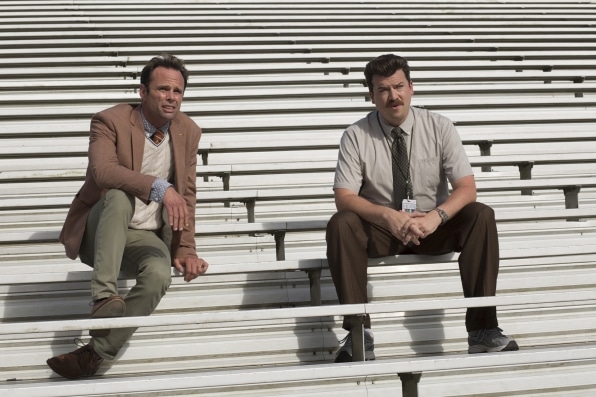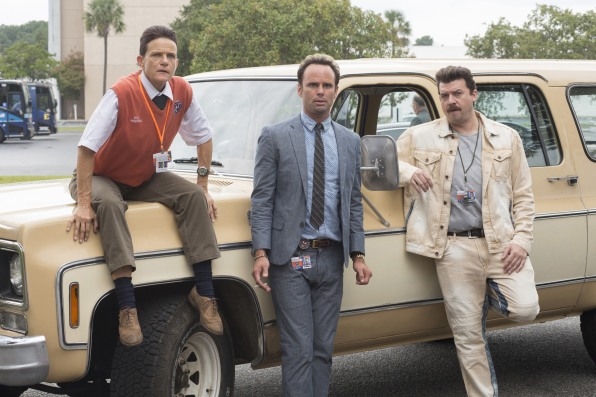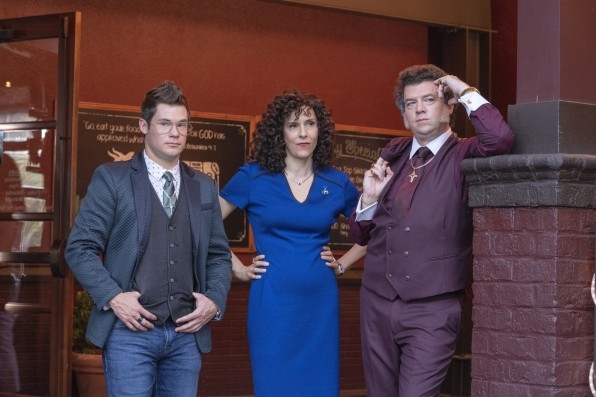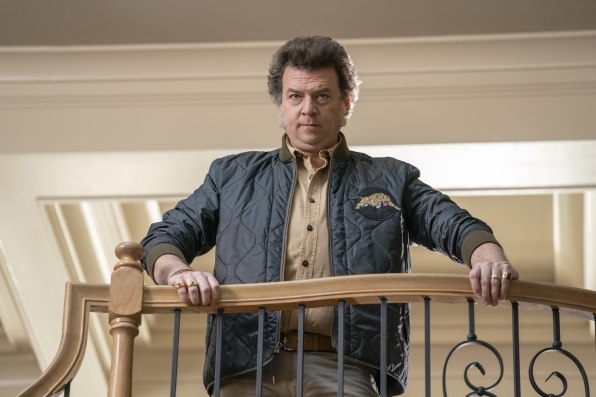Here is what Danny McBride, comedic patron saint of soulful aggro dude-bros, has been up to lately. Prepare to feel lazy about however you spent the last two or so years:
In between creating HBO’s megachurch comedy, The Righteous Gemstones, which he cowrote, directed episodes of, and stars in, he also cowrote and starred in the Netflix dramedy The Legacy of a Whitetail Deer Hunter, cowrote last fall’s Halloween reboot, played a maniac in the comedic thriller Arizona, voiced a character in Angry Birds 2 (he played the angry one), cowrote the upcoming sequel to the Halloween reboot, and is currently finishing the second and purportedly final sequel in this iteration of the Halloween franchise. This list doesn’t include some other things McBride has worked on lately, including an unproduced screenplay about an extra on a Kevin Bacon movie, which he wrote with Righteous Gemstones costar Edi Patterson, and whatever else he has somehow fit into his bustling schedule.
The point is that McBride is a hyper-prolific creator who works well with others, knows exactly what he’s doing, and thrives on chaos.
“It takes a certain kind of person to enjoy the writers’ room experience,” McBride says, over the phone. “Some people don’t like to have to sit there and pull your hair out and stare at each other cross-eyed for hours on end. But I kind of weirdly do like it.”
McBride didn’t always have such an enlightened attitude about the more potentially grueling parts of the creative process. Before he learned the most efficient way to write movies and shows, he had to go through some of the best ways not to write movies and shows. Here’s how his work habits have evolved over the years, and how he gets it all done now.
Coordinated strikes
Although Eastbound & Down, the first HBO series collaboration between McBride and his writer-director friend Jody Hill, has a loose, unrushed feel, there was apparently a lot of self-inflicted pressure going on behind the scenes at first. The only solution was to find a better way to work.
“When we started that first season of Eastbound, we would sit in the writers’ room from like 9 a.m. to midnight every day. Just sitting there hammering on these scripts, not getting any sleep, being completely burnt out so that by the time production started, we were all just fried,” McBride says. “As we’ve done more and more, though, we started to do more coordinated strikes—really just giving ourselves a shorter amount of time to work—and we started getting more work done. If you’re letting yourself be at the office for 13 hours, there’s no fucking way you’re going to work on a script for 13 hours, so you’re going to fuck around on the internet. But if we just come in for four hours, and we know we need to get stuff done by then, the pace of the writing improves. So it’s just been about trying to crack how our minds work and doing things that way.”

[Photo: Fred Norris/HBO]
Hit the ground running, even when there’s no ground
One of the most common ways to eat up time set aside for working on a project is to get lost in the details. For a writer, this means being too precious too early about every scene, interaction, and line. As a way to avoid this trap, McBride has learned the benefits of freewriting just to get going.
“Every time we try to crack a show at the beginning of the season, I really try to push myself to start writing instantly, even if I don’t know where it’s going,” he says. “Even if I’m going to throw away all the pages, it’s just to start doing it, because you can really talk yourself out of so many ideas when you feel a little rusty or you don’t have the confidence yet to start executing the idea. So for me it’s about getting past that and just starting to write and being okay if what you’re putting down is not going to make it into the show, but really looking at it as a way to start getting the engine moving.”

[Photo: Fred Norris/HBO]
Dividing to conquer a unified tone
Over the past 20 years of elbowing his way into Hollywood, McBride has acquired a coterie of collaborators with whom he shares a sensibility and a voice. This crew includes not only his Eastbound and Vice Principals partner Jody Hill and frequent director David Gordon Green (Halloween), but writers like John Carcieri and Jeff Fradley, who have worked on almost every project, and newcomers like Edi Patterson, who came on board as a costar on Vice Principals and has become a trusted writer on the team.
With a show like Righteous Gemstones, the first HBO series for which McBride received sole creator credit, he is able to lean on his relationships with reliable peers to get more and better scripts written faster.
“These shows have such a specific tone that it’s very hard to find people who can emulate it. So I’ll just kind of separate people up and we have these small writers’ rooms where I’ll write every script with the writers, and then bounce from one script to the next and just work with them on it and get it to where it goes,” he says. “But it’s really about putting together a room that is small enough and that you like everyone enough that, like, you can go work with this writer for a week and be locked up and jam the script out in the next week. Then I jump onto another script with another writer and together we hammer it out. So I just have to keep my fingers in every element of it so that it stays consistent.”

[Photo: Fred Norris/HBO]
Spotting dead ends early on
In writing, as in life itself, you may have to walk down some regrettable paths in order to know which ones to avoid going forward.
“I’m now up to like almost like 60 episodes of TV, and after a while you just start to identify what storylines will work and which won’t and, like, what kind of character arcs are going to give you stuff and which ones are going to be a dead end,” McBride says. “We can just identify those things a little sooner than we were able to before. I remember the second season of Eastbound, we were writing for months and we couldn’t crack the season. By the time we were getting ready to shoot, we only had two episodes finished. When we wrote the fourth season, we got halfway through writing that thing and realized that we had gone down the wrong direction and trashed the whole entire season and started over again. I think we’ve been able to avoid missteps like that since then just by being able to identify what works for our sensibilities.”

[Photo: Ryan Green/HBO]
Switching gears can jar something loose
While working on tonally different projects at the same time sounds like the kind of thing that could get confusing, according to McBride, it only helps clarify what you want out of each.
“Writing something like Halloween while we were doing Gemstones was actually really helpful,” he says. “Because it was such a shift in gears that it was kind of like if I ever got stuck on Gemstones, it was nice to drop into something that was completely different and relied on a completely different set of skills. Then I’d come back to it with fresh eyes.”

[Photo: Ryan Green/HBO]
Locking in hours to make maybes happen
McBride doesn’t restrict the concept of coordinated strikes to planning out his writing workday. He also applies it to promising opportunities that come up between projects, which is how he came to write a spec screenplay about Kevin Bacon in 2018 in the middle of so many other commitments.
“It was Edi [Patterson] and Jeff Fradley and myself sat there and said, ‘Let’s just do this in two weeks,’ and thought about what would we need to do it in two weeks. Because I think I had like another deadline for something else coming up,” McBride says. “So we basically gave ourselves like two or three days to work an outline and then we separated up the scenes between us and just spit out a draft in three or four days, and then we worked on rewriting it for another few days. Once that’s done, it’s usually kind of good just to put it away for a little bit, come back to it a month later and read it again, and see what needs to be changed. It’s all just about time management. It’s so easy when you start writing just to get lost in it and let the hours go by. But if you’re a little strategic about when you work on things, you can bite off a lot more.”
Fast Company , Read Full Story
(87)